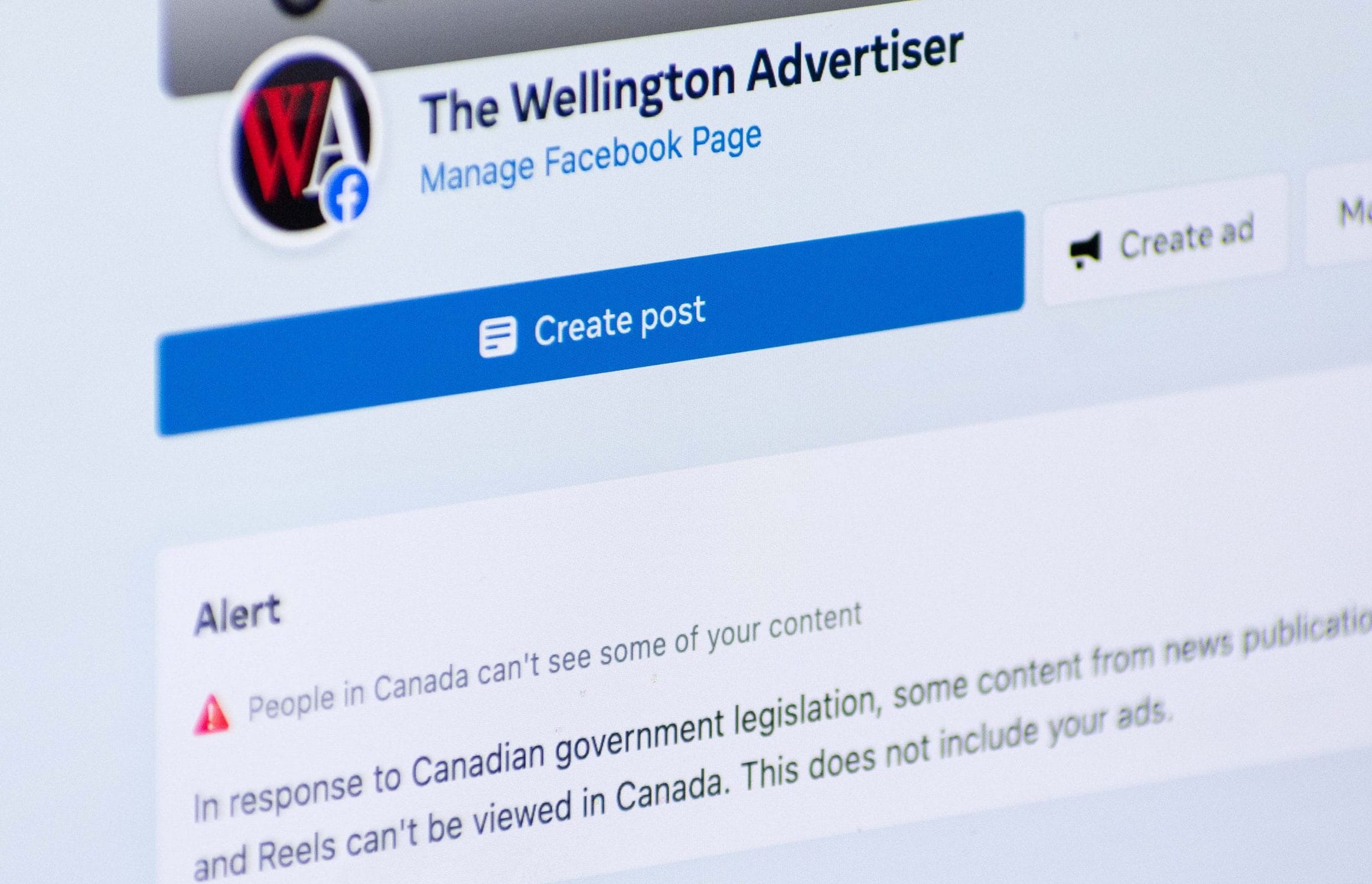WELLINGTON COUNTY – In the next few weeks, Wellington Advertiser readers may notice the newspaper has a reduced presence on social media.
Meta, the company behind Facebook and Instagram, has decided to pull news from its sites in response to the Canadian government’s passing of Bill C-18, the Online News Act.
But Advertiser publisher Dave Adsett says the development won’t impact the newspaper’s operations.

Wellington Advertiser publisher Dave Adsett
“While Meta’s actions may inconvenience some readers, local news is available online and of course newspaper copies are hand-delivered to residents’ doors each week,” said Adsett, who was recently elected chair of News Media Canada.
He likens Meta’s actions to that of a “bully,” noting it appears “even news from soft sources like local radio will also go dark.”
“Meta’s values and the craft of journalism are at odds,” he stated.
So what happened?
On Aug. 1, Meta announced it has “begun the process of ending news availability (on Facebook and Instagram) in Canada.”
The move, originally suggested about a month ago, will be implemented over “the next few weeks,” Meta officials stated.
The company noted the change was made “in order to comply with the Online News Act.”
Bill C-18, which officially became law on June 22, requires tech companies to compensate media organizations for hosting Canadian news content on their platforms.
The bill also introduces a new bargaining framework “to support balanced negotiations between the businesses that operate dominant digital news intermediaries and the businesses responsible for the news outlets that produce this news content,” states an online explanation from the government.
However, tech giants like Meta and Google argue Bill C-18 unfairly imposes on them what amounts to a tax on website links.
“The only way we can reasonably comply with this legislation is to end news availability for people in Canada,” Meta officials stated.
In response, the government announced last month it is removing all advertising from Facebook and Instagram.
On Aug. 8, News Media Canada announced that, along with the Canadian Association of Broadcasters and CBC/Radio-Canada, it has applied to Canada’s Competition Bureau to investigate Meta’s “abuse of its dominant position, as evidenced by its decision to block news content from its digital platforms in Canada.”
Confusion abounds
Some local residents, and indeed many Canadians across the country, may be confused about the impact of Bill C-18 – and the Meta and Google responses to it.
Not helping are statements from some politicians, including Conservative Leader Pierre Poilievre, whose party ran on a similar platform in the 2021 election to make tech giants compensate media companies.
“I think it’s like 1984. You have a prime minister passing a law to make news articles disappear from the internet,” Poilievre told the media on Aug. 2.
“Who would ever have imagined that in Canada, the federal government would pass laws banning people from effectively seeing the news.”
In fact, that is not what’s happening at all.
Canadians will still be able access any news article they want by going directly to news websites, downloading mobile news apps and subscribing to publications.
For example, all Advertiser articles remain available online at wellingtonadvertiser.com and in hard copies of the newspaper.
And if readers can’t visit news websites through Google and its web browser Chrome, there are other browsers and search engines available, such as Firefox, Safari and DuckDuckGo.
What is fair?
Despite claims stating otherwise, Bill C-18 has never been about censorship.
Similar to laws passed in Australia and France, its proponents say the bill is about trying to ensure Canadian news organizations are fairly compensated by tech giants benefiting from their work.
In response, Meta officials say the bill “is based on the incorrect premise that Meta benefits unfairly from news content shared on our platforms, when the reverse is true.
“News outlets voluntarily share content on Facebook and Instagram to expand their audiences and help their bottom line,” the company states.
“In contrast, we know the people using our platforms don’t come to us for news.”

OCNA PRESIDENT GORDON CAMERON
Gordon Cameron, president of the Ontario Community Newspapers Association, calls that stance “hogwash.”
He says Facebook, Instagram and Google sell ads based on the traffic that journalists brings to their sites.
“We shouldn’t have to sit by while others earn money from our passion and efforts while contributing nothing to the cost of its creation,” Cameron stated.
“It’s like believing that as long as we’re paying the grocery stores, the farmers can get nothing.
“In that world, we’d all starve. In the world that Facebook, Instagram and Google seem to want to create, we’d all be starved for credible, reliable local news.”
Reduced revenue
Bill C-18 has been lauded by some as a way to keep news outlets solvent after most advertising moved to digital platforms, choking off a major revenue stream for journalism.
According to government data, Google and Facebook have a combined 80 per cent share of all online ad revenue in Canada, bringing in about $9.7 billion per year.
About 450 news outlets across Canada have closed since 2008 and at least one third of Canadian journalism jobs have disappeared over that time, government figures show.
The Canadian government itself is not without blame when it comes to the current state of affairs for legacy media outlets.
Last year, the government spent a total of $140 million on advertising, with $6.5 million, or just 5%, going to print publications, like newspapers and magazines.

President and CEO of News Media Canada Paul Deegan
Twenty years ago, about one third of the government’s advertising budget went to print publications.
In comparison, government spending on Facebook/Instagram ads alone accounts for almost double what is spent on all print advertising combined last year.
Many have argued the need for government intervention – including Bill C-18 and funding for journalism – could be eliminated if the government simply returned to legacy media outlets the advertising dollars that over the years have been siphoned to tech giants.
Paul Deegan, president and chief executive officer of News Media Canada, suggests CEOs of large corporations should follow suit in order to keep ad dollars in Canada and support local journalism.
“The consequences of inaction are more misinformation and disinformation, a less informed and engaged citizenry, less robust public discourse, and a loss of community,” Deegan stated in a recent column in the Advertiser.
“It’s time for a ‘Team Canada’ approach to advertising.”




